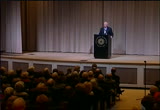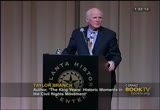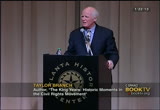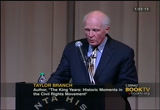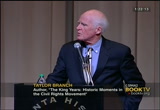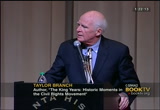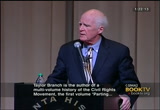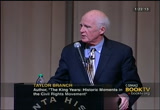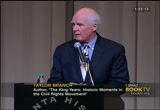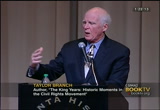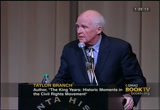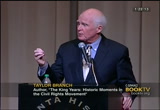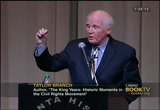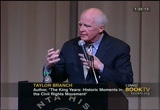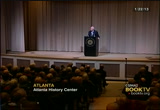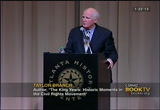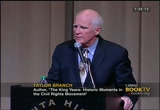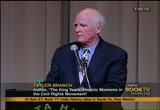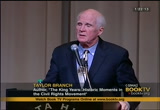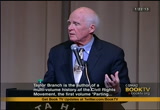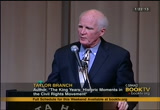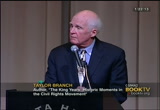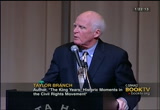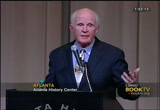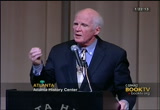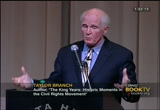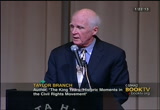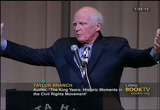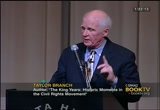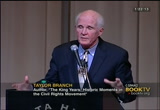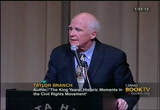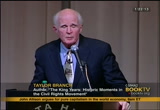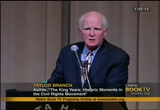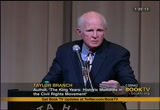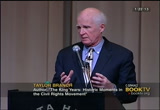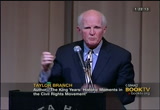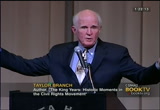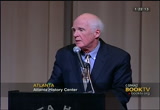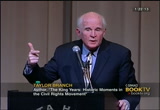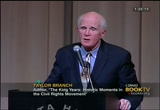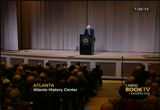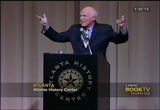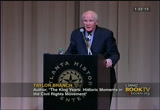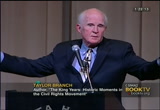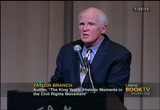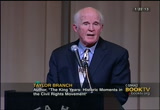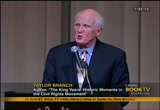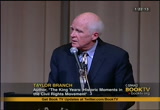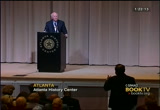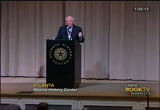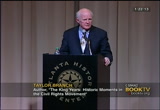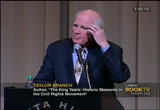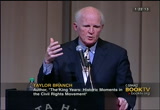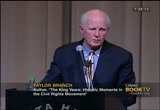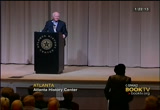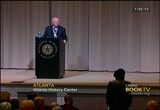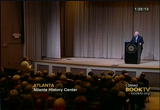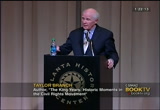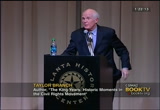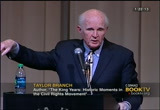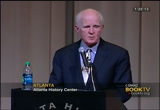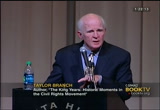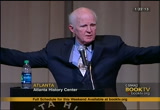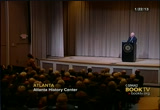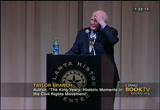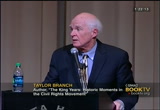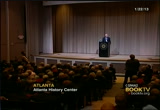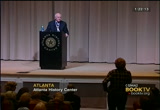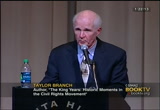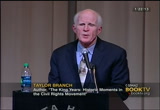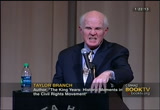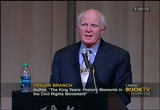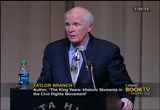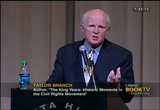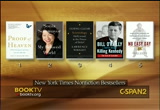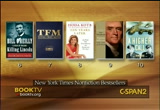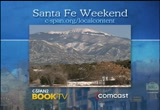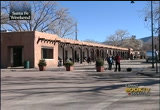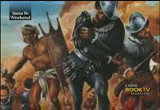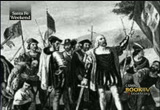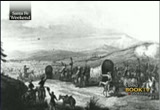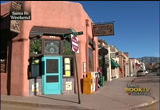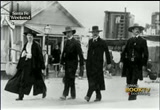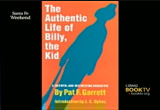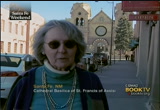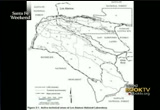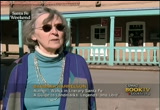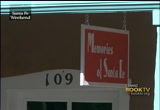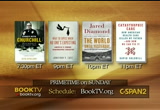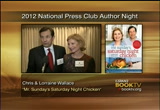tv Book TV CSPAN February 3, 2013 6:30am-8:00am EST
6:59 am
>> we have communities from all over the world, and you go to a naturalization ceremony, it's one of the most inspiring things you'll ever see, we have korean community, syrian communities, people all over the world, there's no foreigner to find to become a fellow citizen. we are not only the pioneer democracy in the world in building our constitution around an idea, but we are the only one
7:00 am
that is really followed through on that saying that because of this idea is an idea that we are fellow citizens, in the laboratory come in experiment of government, that all of us are in this together in a shrinking world, and in the long run and how we relate to korean communities in indonesia and communities and that is a strength for us. that bill was passed in 1965, and i guarantee you not one person in 100 who studies the civil rights movement understands that it is a third pillar, to build a structure that in the long run will be a great not only strength for america but a great inspiration. not because diversity is nice but because diversity is essential in the world that is shrinking. you have to learn how to get along with one another. we are unconscious to a lot of
7:01 am
these things that are consequences of the freedoms set in motion by this movement that struggled for years like dr. king said, we're not there yet, we've got to take more risks, got to go to jail. and he finally ended segregation, gets the nobel prize analyst at said let's have chicken dinners on the nobel prize for 20 years and he said no, we've got to go. in the week is back in jail again. the mountaintop is nice but the valley calls been. we are all blessed by but we are all unconscious by. an example of it, the example i want to give you as how great i think the disconnect is is that george wallace made that speech in 1963, could not prevent any of these great tide of coming to benefit all of us. you have a daughter, and you
7:02 am
want your daughter to have the whole world opened to her, your daughter and your hope stand on the shoulders of the civil rights movement. i don't care who you are. all of this happened and but george wallace while he could not prevent it was a genius in politics, in inventing the phrases that are chillingly contemporary, even today, that when it no longer was respectable to defend segregation, he made it respectable to cut the process and to place the fears and the resentments of the process as it was let loose saying that pointy-headed bureaucrats were telling us how to run our businesses and wearied we could go to school, and that they were in cahoots with a biased national media that had a racial agenda to help pointy-headed
7:03 am
liberals concentrate all effective power and the central government in washington. now, if any of that is familiar to you, in contemporary politics, i submit to you that those phrases were invented by one of the great geniuses in modern politics. and concentrated. they were george wallace. and on top of that, wallace had another part of his genius. he insisted in public that he had never made a single comment in his public career that reflected poorly on anyone because of race. he would get indignant if you suggested that. and that's part of the formula, a willful unconsciousness to the power over ignorance. in our society makes us blind,
7:04 am
slowly, so slowly and so pervasively that now i think it's totally unconscious. people just repeat those phrases because they are normal, and they are normal from the right and they are normal from the left. people don't understand how much the left has contributed to the same sort of modern cynicism that does not take credit for their sense of capacity we should have, that if we could tackle all of those problems in the '60s and let loose this liberation that benefits everyone at such a low social cost, if we recover our sense of confidence and sense of commitment and struggles to reach across the lines, that was the essence of movement. that's the essence of martin luther king day. get outside your comfort zone which is what people in the movement have to do, let your knees shake, let's reach out to someone across the line to take a chance that you can create a movement. that's what he movement is. it starts with something that is a small inspiration and grows and you discover the power between you.
7:05 am
and george wallace is exactly the opposite of that. take counsel of your peers, take counsel of your relentless, and essentially adopt a cynical and blind attitude toward the possibilities of democracy. cynicism is an appetite, not a judgment, not a measured judgment. democracy requires measured judgment and informed citizens who are willing to take responsibility. cynicism creates consumers who complain and have very low expectations, and have a very low sense of citizenship. and in that sense i think we are out of base with what ought to be a great optimistic sense of if we could have done this in the '60s, now we have a lot of serious problems with an economy that's been stripped of its industrial base and facing international competition about environmental problems. we've got justice problems. we've got family problems. where is our sense of confidence
7:06 am
that we can tackle these together, and that our strength is in the bonds that we create across the lines that divide us? which is, that's the essence of patriotism. that's what democracy is. that's what george washington was doing, and in that sense that's what martin luther king and the movement were doing. they were confronting movements that deny people their natural strength that benefit everyone, and subjugated people come and they were figuring out ways that were productive to set in motion these freedoms to strengthen everyone and increase the army and the ties that bind, after comfort to secure tonight. we need to do it again. in order to do that we have to have a better sense of our system. because our history is not just about where people sat on buses in a quaint distant era in our history is about our future and what tools we're going to use and what memories we're going to
7:07 am
use and what risks we are willing to take to build things, to build strength across lines that divide us. it's not new that we remember our history that race relations are involved. i think that we should be ashamed of doing it both on the left and the right that we don't do it, and if you're interested in why, i've mentioned george wallace, i can also, people in the civil rights movement turned against a lot of their own examples. number one, nine violence. nonviolence became in popular among people in the civil rights movement. the most powerful idea was the first one that was abandoned and there are a lot of other pashtun religious. the left turned against religious. when it was half of the movement inspiration and half of dr. king's magnificent formula of equal souls and equal votes, one
7:08 am
foot in the scriptures, one foot in the constitution. than the next thing you know people are turning against the spiritual base of democracy. we must remember the civil war for centuries, when our growing up in atlantic of my textbooks in the civil war had nothing to do with slavery and we got a lot of sentimental gone with the wind. and to this day, there are textbooks in history that refer to the political movement that overthrew the reconstruction government after the civil war and restore white supremacy in the south and pave the way for segregation, the textbooks referred to the movement as the redeemers. the redeemers we deemed the south. a religious word that in reality was accomplished by care. terrorism as much as terrorism that plagues the world that we see when it's not -- harmonious.
7:09 am
so it turns like turning our whole perception upside down. and that's a terrible thing. but also can turn our politics down but one of the chapters in my 18 sure, i but to capture together about 1964, that in 96 for your democratic convention and republican convention. the republicans were first. the republicans were the party of lincoln meeting in san francisco. they normally had over 20% of the delegates, not quite 20%, were african-american. the black and tan republican. 1964 they expelled virtually all of them. they had only 13 delegates. they kicked them all out. barry goldwater met with two lawyers, william rehnquist and robert bork, and announced he was going to vote against the civil rights act of 1964, not
7:10 am
for racial reasons, not because it was usurpation for states. instantly the first seven republicans sprang up on ground that i didn't even know any republicans what i was going up, the republicans were yankees, and -- we had solid south democrats. and the next thing, and there was not one single member of the house of representatives in the republican party from texas, really from new mexico except for george bush the elder, to the atlantic ocean. not one. in that same year that they spring up then, and not only to dominate the brand of southern republican party, but to dominate the national republican party along the lines of the language that george wallace had invented, and handed over to them. that senior lyndon johnson met
7:11 am
in atlantic city, in the chapter i have here, to me it's amazing this is not more news. i have written in detail as i can, he had a nervous breakdown because he's trying to do little delegates from mississippi, and to see all the regular white democrats from mississippi who would publicly pledge to vote for goldwater, the democratic delegates said they would vote for goldwater, and most of them started switching party instantly but he wanted to defeat them anyway. and the mississippi freedom democrats, they walked out because they didn't think it was fair. and karl sanders and one of the conversations you can hear, and john connally, called lyndon johnson and told them if you would even let those two symbolic, the whole south will walk out of this convention
7:12 am
because you will be turning the democratic party over to the negro, and letting martin luther king decide who can be a democrat. and johnson almost has a breakdown on the phone there, and basically went to bed for several days and said i'm going to quit. i can't handle this. i'm trying to turn the democratic party slowly toward a party that will represent its people. and he told karl sanders, he said, you and i cannot survive in our modern life, virtual exact quote. you and i cannot survive in the modern political life eating these folks for breakfast to win elections. we've got to let them vote. we've got to let them eat. we've got to let him shave, and these folks don't do it. and he thought he was going to quit. he said if i'm no good in the south, what good am i? i passed this bill and it looks like i can't do anything. so what i'm saying is that race
7:13 am
without any public acknowledgment, either then or largely in history today, turned the partisan structure of the united states upside down in one summer. it's still that way, and it's still not talk about. and what i'm saying is that what i have learned from studying this movement all this time against my will, because this power drag me into it i'm sure glad they did, is that from frederick douglass to martin luther king to barack obama today, that magnificent progress that's going forward, we change, we are more accepting, we have a lot more blessing, we have a black man in the white house, but the acceptance and public culture of barack obama by the millions of white people who
7:14 am
voted for him is still largely on their terms, not his. it's the people on the other side who are forced to accommodate across the lines, force always black folks have had -- it's not a choice and luxury to do with race. including barack obama who can't talk about race right now because if he does, the people who voted for him will find some reason to say that he is emphasizing too much. so race is still there. a place, it can pay enormous dividends in our future. to me, it is vital we get our sense of history more in line with what happened so we can restore our confidence and capacities of government to move forward. and i'm not saying it's going to be easy, but i think that it's beginning to have -- we have five years of anniversaries of things that are great blessings, not only for black people but for all white americans, and the need for the whole world who are now showing in this democracy.
7:15 am
if we understand what it is doing, and it is a vital path for us to do it, but it doesn't happen automatically. it begins with every citizen. the great thing about the civil rights movement is that it showed that the promise of democracy comes when you have a morale of citizens rate -- sensor, a movement, the watchword then was movement which means you're actually moving somewhere, the watchword today is stan. when that happens the elected representatives will respond whether they want to or not, and sometimes they will inspire you the way they respond. but you need both of those things coming together. and in order to do that you have a sense of history because that's what our citizenship comes, and that's why i'm up here with this short little book, 18 moments. i've just mentioned one. those two conventions in 1964
7:16 am
with a kind of fulcrum of the history. so let me start. i said i was going to be short, and i was longer than i wanted to be. there are plenty of questions about this because on trying to lay out something in a very, very broadscale about a novel experiment to address something that i think is coming up in the next five years. we are either going to come out of this doldrums, out of the unconsciousness traps that we are in. we've painted ourselves into a corner, but lots of people believe that what protects their freedom is the shotgun in the closet and not the ties that bind us together throughout the course of the great ride of american democracy. and it's not true in history. it could be true, and it is important to be vigilant against tyranny, but it's also important and more important to stretch your cells to understand the
7:17 am
true promise of our history. because it's not obvious, it's not easy for anybody, and for some of us we have a record of being unconscious to many of the same things that are most inspiring. i count myself privileged just that most of my life working on it. i commend it to you and let me stop there and then i will take any question you may have. thank you to the history center for having me. [applause] >> if you would please come to the microphone. >> thank you for the talk. curious to get your perspective, one area that has evolves and so civil rights is we have been his last election has shown can we become a majority-minority nation. unite the country, not only do have different people from
7:18 am
different ethnic groups which have a lot of blame to do that come to this nation. you have an african-american president. you also have a president who i think it's a very good speech yesterday, very optimistic about the future, that touched on this area of looking at our gay brothers and sisters and making sure that they have the same opportunities as everyone else. the younger generation that you're targeting, this is the world have grown up in. they haven't seen the things of the '60s. what lessons do you tell these teachers are in your book that you want to transform and give them that they can take and evolves as good american citizens that you're trying to kind of bring across? >> well, that's a very good question. i think you will find in there that one of the lessons is that there are many different kinds of leadership. as i said, dr. king openly confess that at times he was behind the students. he was at to -- really three, 18
7:19 am
chapters are about got moses. these a model of what dr. king is like moses, a lawgiver, follow me, standing up there on top of the mountain while moses is the anti-moses. is very quiet, mystical, a grassroots person. i'm willing to go to the courthouse if we're going to get beaten and arrested and jailed. there are a lot of different models of leadership. one thing is, on its face, young people today need to know that people their age were leaders in serious problems. in the 1960s, that the race issue was so great that most adults in that period had opposed what they had under control but really it was a total fake.
7:20 am
and people were flummoxed by what to do. if you talk about looking at prom and i figure out what to do, most of th you don't leaderp in the 1960s were looking at it maybe in the shin. certainly not in the eye. these kids were leaders. the fact that you can have kids set forward, and you never know where in the life cycle your testing moment is going to be, is one of many lessons. the first chapter of this book i spent lots and lots of time trying to figure how to begin, and i began with dr. king's first speech on the monday, when he comes home and says i can't eat dinner because these folks just made me head of this protest committee. because they didn't expect it to do anything and they're going to
7:21 am
depend on the young guy in town. he had to decide what to say. he couldn't have done. he walked in there totally unprepared most of the people are strangers to him. he didn't know that. he was new in the community. he was only 26, and you can hear him in the speech, this is what i try to re-create, stumbling around to make a connection to an audience that he doesn't really know. and when he does make a connection, you can hear it. i mean, i believe if you go to the king center and listen to this paper, they will let you do it and i hope they will, you can hear the moment in which strangers responded to the things that he was trying to say in the way that became a wave. and a communion emerged between him that made, and an audience, that made him for ever a public person. and it is a movement in the sense of what a movement starts. nobody had any since that was
7:22 am
his store and who's going to blow up into the film of march. you can see the voting rights act of being born. that's what a movement is literally historic. so i would say the lesson is that young people can be important, that movements are very complex things that involve internal struggles and people arguing, and a conflict with himself and reaching outside themselves over what's really important to them. and that the history of this movement shows that adults, too, can change, and that i would say robert kennedy about, is a prime example of that. somebody who's not really studied that much today but if you look at him over the course of his career, what liberated him and turned him to a pretty hard-nosed cold war politician was raise. somebody who could go in to
7:23 am
sharecroppers shacks in mississippi and sit down with malnourished babies on his knee and talk to them about what they're eating and talk about hunger. that was a transformation in people like him, and people can change, but, and there are many doorways are doing it but in the u.s. history the chief doorway for the profoundest change has been when people go across the barriers of race. and that's the great lesson of the movement. because good things happen when you do. anybody else? >> about some of the myth, memory of alabama and when george wallace was making those proclamations in 1963 down in
7:24 am
mobile, alabama, spring hill college had been desegregated since 1954. and the change in my life came from that class of 1954. i know i'm telling my age -- [laughter] but when i voted, for the first time i had to pay poll tax. somehow i lost that received over the years, and that really hurts me, but i think my change came, and, of course, it was a catholic school. it was a jesuit school. people asked me how did you feel. i said, well i felt like any other freshman going to school. i was more involved in what i was going to wear and what i was going to do. but i remember every african-american who was in my class, and there weren't many,
7:25 am
let's be honest, and they were -- [inaudible]. but the school has grown, and so might change started in alabama, and again, i remember a picture of george wallace on the front cover of "the new yorker" magazine, and he was addressed like the statue of liberty. and it said rednecks in new york. [laughter] [applause] >> yes. yes, sir. spinning i appreciate your work. it's really wonderful. i'm sad it has to be convinced but i appreciate you doing that. i'd like to hear your thoughts, vincent harding wrote a book a while back on if i would like to hear your thoughts, especially with the ms. memory of dr. king. there are now full-page ads by
7:26 am
the corporation and such. so i'm wondering how much dr. king has been sanitized, how much we need to remember what you've been talking about. so i would be interested in hearing what you think dr. king would think of us at this point and where we are and where we might should go. >> let's be realistic but every iconic figure in history is fantasize it to some degree. george washington, lincoln, all of them are. it's not a crime to sanitize dr. king, but it is, the danger is when you, when people unconsciously sanitize him to make you more comfortable for them. if that's what you want -- i have come and lots of people, everywhere i go say i can prove from dr. king's "i have a dream" speech that we should need me talk about race today. we should only be talking about character. the content of character.
7:27 am
and i say that is absolutely right. if you are making the same effort that dr. king made. everyday of his life, to reach across the boundaries that divide a people so they could pursue character, he was willing to go into the southern baptist seminary where they voted not to hear his speech, and talk to people who loathed him to try to have the message out there and try to get to the character across those lines. if you make those efforts, and your talking about character, you will understand the meaning of race and you won't need to talk about it so much. but to say that blindly, that i'm only about character, therefore i don't need to be talking about race, is george wallace saying all my politics don't have anything to do with race. that is just self-deception, and, but it is dangerous self-deception because over time the broken loose a sense of why they are doing it. so dr. king, i never tried to speak to dr. king but i can tell
7:28 am
you probably said the same thing he always said, which is we have come a long way but we've got a long way to go, and what to do is to consult our deepest values and take risks for them. that's what he said. and he also always said what is democracy but a system of votes, and what is every vote but a little piece of nonviolence. a little piece of nonviolence that shows that we can settle things across -- the bedrock announcement or agreement of americans is that people who can't stand george bush and who can't stand barack obama are going to respect votes to allow those processes to go forward. and that is nonviolence. in many of the country in the world, including the ones that will be in the headlines yesterday and the ones in the headlines tomorrow, people don't do that. and that's why so much of the world is still in flames.
7:29 am
>> you seem to have a sense of stark reality that might happen if america doesn't reclaim that sense of history. regarding the promise of democracy. so if that doesn't happen, what do you foresee in the next several years as the future of america evolves and the changing demographics, et cetera? am i asking the question? >> yes, ma'am. well, if you studied history, sometimes it takes catastrophes to get people to wake up and get a better -- the civil war is about as big a catastrophe as you could ask for. and a century of segregation was a catastrophe for black people. most of the rest of the world was unconscious but that's the price we pay for not remembering that history. if we don't rebuild our sense of confidence and a sense of faith,
7:30 am
and faith in one another, there are any number of problems, poor education of how to adapt economically and a globally interdependent world. that could cause all kind of social dislocations in the united states. so i hope that's the great thing about it, that's one reason we should be so grateful to dr. king and not see him as a leader for black folks. we should see them as a leader for fairness and for dealing with the most troublesome problems we have by that message. if we do that we have a chance to address these problems before they become acute, before they become -- we have terrible social dislocations. so yes, i think these are very serious issues. i think the health of a democracy and the capacity people, it's no joke that we sit around and we said it would totally dysfunctional. and what i'm hoping is some of that comes out of culture.
7:31 am
ever all local to sleep in a sense of cynicism about politics and don't see that politics start with you and me and what we're going to do and who we are going to talk to tomorrow, and how far we're going to reach to try figure how we ca can address any one of the serious problems that threaten the country, that we can risk that sort of social dislocation. that could be catastrophic. i don't care whether you're talking about the environment, the economy, education, health, our prison system, our justice system, and on and on. we have a large number, the ngo movement, nongovernmental organization. the public interest movement is wide and diverse, but didn't really exist very much 50 years ago. what it doesn't have is the cohesive sense that working on related problems that out to greet some sense of movement and some sort of sense of, that we
7:32 am
are indebted to our country -- history for if our history were more accurate. you know, i think that history is about the future. and that the future, if the future is dangerous, then it will be less dangerous and more hopeful the better since that we have of our history. but, you know, i'm a historian but i guess you can expect me to say that but i'm trying to put it in a different way. yes, ma'am. >> i also want to thank you for the wonderful work that you were doing, and grandchildren that i doesn't want to share it with. but my question is about another age group. as a look around this room, i see a number of white males of a certain age who probably lived through much of the time that you are talking about, at some level or another. i'm curious to know what is the response to your work from these
7:33 am
men. >> from white male? >> white male primer or white from that generation. >> oh, i think the one to read it are the ones who come talk to me, it's pretty darn good. [laughter] but i don't know how big a sample that is of the larger population. [laughter] to some degree, i'm preaching to the choir. but i will say that some of my, personally, i mean, doing this work puts me largely in the black community for the resear research. the time that i interact with white people the most about it is when the books are out. and i will say that, i mean, not exclusively. a young man, this is a cross-cultural history, and i
7:34 am
don't, you know, i had interviewed as the people in the lyndon johnson administration as i had interviewed around martin luther king. but when the books come out and i try to talk to people, anybody who has read it, some of my most inspirational responses have been from older white men. women are better, quite frankly -- [laughter] [applause] but when you get something from a white man, for that reason, all the more, it's -- i mean, the movie was basically run by women as long as there wasn't a microphone. that's just a truism of history. and to some degree its culture. i don't know how that will survive the digital age when men can do a lot of things from the computer and they don't have to go out and set the table. yes, sir.
7:35 am
>> you are about to hear something from a white man. [laughter] ma'am, before you leave -- [laughter] before you leave, please come down here your. [laughter] i would like to answer your question. because i was a young man in my 30s during the civil rights movement, and one of the most shameful things that i feel is that i kept my mouth shut. i think i am not unique in this group. there was an intellectual debate that went on, discussing america and the issue of property rights versus civil rights. and it was a heated debate
7:36 am
within, among my friends. but i wanted you to know that i'm ashamed. [applause] >> thank you, sir. thank you. two questions rolled into one. thanks for your talk today. it opens my mind in a number of ways as a teacher, as a historian. on the one hand, you talk about the unconsciousness. i love that, and the mismemory. and it begs the idea of wb to boys when he talks about race as a major challenge for the 20th century. and so i'd like for you to kind
7:37 am
of reflect on what you see today and this whole idea of race in the 21st century. and my second question is, how to do more with your book and the 18 chapter, how do you get to the. did you say i'm going to do 18, or did you eventually it came out to be 18 because you refer to the and i see it's in the book. >> to answer the second part first, no, i did not 18 in mind. i wanted to pick out, and i wanted to pick out the ones that i thought were essential to communicate the sweep of the. not all the particulars, and please, somebody said i'm sorry you had to distill or appreciate and make a compact. the other books are not going anywhere. [laughter] they are still there. i'm hoping that we some small portion of people in the subject
7:38 am
want to know more about it. and go not just in my book but there's lots and lots of books. the ones that are cited, it's the whole universe, largely uncovered by hollywood by the way. part of that. because hollywood, and i know this from 25 bitter years trying to any of these stories made into film, they want to show, they are afraid of showing anything that will make viewers doubt that they are on the right side. and, therefore, they can't show people in the movement themselves in conflict. and that's what's real. and so they don't do it. so these things, these things are really hard, but i took, i wound up with 18 simply because that was the standard. as i said, i would say martin
7:39 am
luther king, the first chapter is about him, and the last chapter is about him being killed, but the 16 in between, maybe half of them are mostly about king, and others about other people. the freedom ride is the only thing that had two chapters. i think that's significant because the freedom ride, a movement start small, starts in somebody's small inspiration and it grows. it grows in scope and definition, but mostly in the identity and the way people think of themselves. the freedom rides were young people, literally expanding the scope of a movement from something that was campus-based and if one thought they were doing what they were getting their degrees, and by the end of people said this is what i do. and i'm involved with anybody in the united states who went on the freedom rides and came into jail. and i'm willing to go anywhere to work on them.
7:40 am
so in so many respects it expanded, so i have two stories about the freedom rides. diane, probably the most overlooked central figure in that period. so it came out, it came out that the stories turned out to be 18. and when i did i felt i could boil down the gist of it to give people a sense of it in the number. i really had more of a sense of pages. you cannot do this 800 to come you can't do it 400, let's see if you can do it under 300. and i'm very proud of this, i dated under 200. [laughter] [applause] >> and i wanted to go the extra mile on the chance that what i'm hoping is to have people say wow, we are so out of -- what is
7:41 am
this that we don't and our politics is paralyzed and that we don't talk more about race. i forgot what you said at the beginning. >> dubois. >> dubois. the problem with the 21st century, it didn't go away, just like my three books didn't go away. but i don't think it's as essential. when he spoke, remember, the world was still colonized. most of the world was colonized at that time, and were utterly owned by the european nations. and our only claim to fame was that we said we did much of an empire but we are growing into a superpower. and in some sense we got a pass. and in that sense it really did make race through colonization,
7:42 am
and raised because of segregation in the united states, and the legacy, a global problem. we are still dealing, there's a lot of truth in the wags who said the world is still paying in pain and dislocation today, anyplace and wrote that he french or british diplomat to align on the map weather was creating a rock or grading syria or grading all the nations in africa. we're still paying a price for the. there's a lot of race involved in that, but there's also globalization and economics coming together to complicate. but raise, if you're talking about the division that cause people to start thinking like enemies are still very much with us. [applause]
7:43 am
>> thank you very much. i want to thank the taylor branch for being with us tonight. he will be signing books in the library. i want to thank the livingston foundation for sponsoring this lecture. and also, if anybody out there in california is listing, please send me back my ipad. >> thank you very much. [applause] >> for more information visit the author's website, the taylorbranch.com. >> here's a list of the 10 best selling nonfiction e-books and print titles according to "the new york times."
7:45 am
>> for more on these bestsellers and more, go to nytimes.com and click on arts. >> santa fe has the highest elevation of any capital city in the united states, sitting 7199 feet above sea level at the base of the mountains. the highest peaks reaching 13,170. booktv's recent visit to the airy visit to the airy with the help of comcast, our legal cold -- our local cable partner, brings you much of the culture.
7:46 am
♪ ♪ >> hello. i'm barbara harrelson. we are here in downtown santa fe, the historic plaza, and the palace of the governors which is the oldest public building in the united states. santa fe is the oldest capital in united states, and it's been here for more than 400 years. it's got lots of stores to do. and i've been conducting a literary walking tour of santa fe since 1996. so i would love for you to join me to hear some santa fe stories. we are starting on the plaza in downtown santa fe because this is the heart of santa fe today, as it has been from the very beginning at its founding.
7:47 am
this is where community defense still happen. this is where traditional christmas pageants take place in santa fe today, as they have for the last couple of centrist. this is also where the first american revolution took place. thi have a book at some of you y want to read. this was an important event. not only in santa fe sister, but in the history of the nation because this was the first successful uprising by native people against the european conquerors. the pueblo peoples join together and forced the spanish out of santa fe into exile, 300 miles south of here where they stayed for the next 13 years. our history and culture is so
7:48 am
rich because of the three dominant culture groups that have influenced it. starting this, a native people and they're very strong oral story telling history. before the books an alphabet for them to write down their stories. they danced their stories. they did rock art. they told their stories through families and pass them down from generation to generation. and even today, the native peoples believe that the most sacred stories should only be passed down by word of mouth. another important influence on our literature and our culture of course are the spanish who ruled in santa fe for more than two centuries. and the first piece of literature to emerge from this era was actually written by a spanish officer who came here with a confused authorities, and it is his firsthand account of the settling of this country at this part of the world and some
7:49 am
of his famous battles. the title of the of the poem he wrote was -- which simply means the history of new mexico. it is the alias firsthand accounts, and was published in madrid in 1610. the original copy is here in our history library that is part of the museum of new mexico. the third dominant culture are the americans who came here. remember, santa fe was spanish for more than 200 years, then for 25 years we were a part of mexico. and then after the united states thought a war with mexico, we became a u.s. territory. and the santa fe trail opened bringing in americans, or the first quote unquote white man into this part of the world. and so the impressions of some of those early traders and
7:50 am
settlers who came across the santa fe trail are an important part of our literature because they read ported their experiences and their impressions of santa fe, the old royal city. and many of them could not believe that a royal city had houses made of mud. there was a little bit of culture shock. others took to the exotic feel of the place and the beautiful mountain setting right away. and that is true even today. santa fe inspired strong emotions. for example, a man named chris wilson who was an architectural historian at the university of new mexico read a book not too long ago called the myth of santa fe. in which he documents the evolution of santa fe style and why the city fathers decided that we needed to improve the santa fe look to an earlier time in order to attract tourism. and why did he feel that that's not necessarily been an
7:51 am
advantage for santa fe's culture. and certainly not to advance authentic indigenous architecture. a famous novel was written in the latter part of the 19th century that is still in print today come has nothing at all to do with new mexico. it was an accident of chance that the author was general rawlins who wrote ben hur, the last few chapters were written here in the palace of the governors in santa fe, new mexico, because general wallace had been called upon by the president of the united states to come here and serve as territorial governor and try to resolve the lincoln county war and some of the other problems in this very wild territory. i mean, gunbattles were taking over and land grabs are taking place all over new mexico. it was a really wild west. while he was who he had to grapple with billy the kid.
7:52 am
and billy the kid is a real live historical character who has inspired probably more writing, fiction and nonfiction and anyone else in new mexico's history. some of the letters that billy the kid wrote to general lee wallace asking him to honor the author of a pardon, which billy the kid said that the governor reneged on. some of those letters are in our history library and what surprised me, they've only been acquired in the last few years. what surprised me is that billy the kid was literate, and their -- his handwriting looks pretty good. the legends of billy go on and on and on. the man who killed her the kid wrote his story called the autobiography of billy the kid. and then one of the world's foremost living billy the kid experts, frederick, has annotated that book so there are plenty of literature out there,
7:53 am
fiction and nonfiction if you want to find out what you think about billy the kid. we are near the famous santa fe cathedral, the cathedral basilica of st. francis who was a patron saint of santa fe. and santa fe actually means holy faith. and there are lots of stories about santa fe and its spirituality. but one of them was famous is the willa cather novel, death comes for the archbishop, which is historical fiction based on the real lives of the archbishop it came to santa fe in 1850, served as santa fe's first bishop, and later first archbishopric and he was sent to to make reforms and he said school he ended up excommunicating some of the more popular hispanic groups in northern new mexico. a famous book about the same man and the same era is written by the late paul hogan and it won the pulitzer prize for biography, and it is called his
7:54 am
life and times. and that's a book that should be read side-by-side. we are here at 109 east houston which is the name of the storefront. it's also the name of a book, a nonfiction book written by jim may which tells the back story, if you will, some of the personal stories of the scientists who came here to work on the manhattan project during world war ii to build the atomic bomb. robert often i am or who had been selected to lead the project from a scientific point of view, and often i am a new new mexico and knew that secluded plateau because he would come here as a boy and spent summers at the ranch school at los alamos. he thought that would be the perfect place to do the secret project. he's very well respected and
7:55 am
educated scientist he lets let not the fastest europe and was recruited work in this project. so he rode the train powder, and was met at the station and driven into town on a little check-in at this store which was supposed to look like just a regular tourist store in santa fe. but is offered by a woman named dorothy mckibbin that oppenheimer had a person recruited she process of papers and gave him instructions. they would be going up to los alamos and, which was guarded with a secure perimeter that they would me perimeter that they wouldn't be coming pakistan to fight that often, but if they did come, that they were to use not their own names, make up some kind of a name and not very much at all because they all spoke with accidents are they managed to build the bomb and helped end the war earlier. but it does have had an impact on santa fe. there were rumors about spies,
7:56 am
about local secrets being traded to the russians. and we know now that that was done here in santa fe. and other book that is very close to my heart, i want to tell you about, an older book but it, too, is nonfiction. it is the house -- it is a more important book and a more representative book in terms of taking in lots of aspects of new mexico's history and culture. how we are a land of stark contrasts and contradictions. in the old and the new. and so that's what i think that book addresses all those issues more than, for example, 109 east palace which is a specifically about the project and the people who were involved in it. so to learn more about santa fe and the next year and its
7:57 am
literary heritage, then i'm so delighted to been able to take you on this, just a few stops, and to touch on a few of the important works of literature. and hope that it will get you to explore more on your own. >> for more information on booktv's recent visit to santa fe, new mexico, and the many other cities visited by our local content vehicles, go to c-span.org/localcontent. >> you are watching the tv on c-span2. here as our primetime lineup for tonight.
7:58 am
>> that all happens tonight on c-span's booktv. >> for news watchers, some for my faces on your screen. that is chris wallace, host of "fox news sunday" but he is joined by lorraine wallace today and we're at the national press club, where they have a book. chris wallace, did you ever think you would be talking a cookbook? >> well, i'm hawking it. my wife turned one, rota teq in the story is the first sunday that i started doing "fox news sunday," lorraine said what would you like what i said chicken. qaeda might do to comfort her to decide which isn't what you like what i said the first week went well, let's have chicken. at eight and half years, almost nine years later, she's got a book and i'm still on the show spent 100 chicken recipes with
7:59 am
50 vegetarian site. you know i've got to step up my chicken. what i learned is chicken is the most versatile ingredient that you can use in the kitchen. you can do anything to it. you can bake it, roasted, pound, barbecue it. it's amazing. >> lorraine wallace, are these your own recipes of? >> all of my own recipes. it's what i love to do spring and i and the tester. tester. i haven't got any of them but i've beaten everyone. everyone. >> each chapter has family stories and family photographs and each recipe has like the little family kitchen about. >> can you give us background on you too. how long have you been married? >> we have six children and have been together for 16 years. >> but i have to say it's the old fashion way. she has four, i have to. >> so getting her family around the table and trying to fi
111 Views
IN COLLECTIONS
CSPAN2 Television Archive
Television Archive  Television Archive News Search Service
Television Archive News Search Service 
Uploaded by TV Archive on

 Live Music Archive
Live Music Archive Librivox Free Audio
Librivox Free Audio Metropolitan Museum
Metropolitan Museum Cleveland Museum of Art
Cleveland Museum of Art Internet Arcade
Internet Arcade Console Living Room
Console Living Room Books to Borrow
Books to Borrow Open Library
Open Library TV News
TV News Understanding 9/11
Understanding 9/11